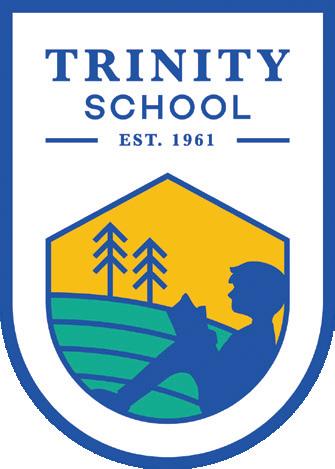

TRINITY SCHOOL STRATEGIC PLAN 2022–2026 TRINITY 2026

1 Introductory Letter 2 Context for Our Goals TRINITY 2026 GOALS 4 People 5 Program 6 Permanence TRINITY SCHOOL VALUES 8 Mission 8 Beliefs 9 Episcopal Tradition Contents Trinity is a place to be yourself. You could be a leader. You could be a teammate. You could be a friend. You could be an upstander. —TRINITY STUDENT
Dear Trinity School Community and Friends,
What a remarkable journey we have taken together to plan for the future of Trinity School!
In February 2020, right before the Covid-19 pandemic began, the Board of Trustees and Administration embarked on a strategic planning process. We are pleased to share Trinity 2026, a four-year plan for our school and community. We are grateful for the active and thoughtful participation of Board members, administrators, teachers, staff, and parents in this process. Trinity 2026 is a living document. It will provide guideposts for us over a four-year horizon. At the same time, it will give us a framework to assess new opportunities that may emerge as circumstances and needs change.
As you read this plan, you will see that we have organized our thinking in three areas: People, Program, and Permanence. This reflects our conviction that the school’s future depends upon a thriving community of diverse students, teachers, and families; a program that continuously evolves, bringing new definitions to academic excellence and social-emotional health; and a financial model that ensures the school will be here for future generations of families seeking pre-school and elementary education grounded in the Episcopal tradition.
Early in the process, we scrutinized our long-standing Mission and created a set of Belief Statements that inform everything we do at Trinity School. We hope you will take a moment to read both and ask yourself where you see evidence of these intentional words in the school’s daily life. We find examples daily, in the teaching and learning from the classrooms, on our playfields and outdoor learning environments, in meetings with our families, and certainly in the work of the Board of Trustees. We know this plan will create more profound and richer examples to make us all proud to be part of this special community.
We look forward to reporting to you and celebrating our school’s strength over the next four years. We are grateful for your interest and involvement in Trinity School. Our young people need a community grounded in shared values and a learning environment that inspires them to do their best. With those aspirations in mind, we invite you to explore Trinity 2026
Warm regards,
Matt Allio Michelle Swenson
Head of School Chair, Board of Trustees
1
Context for Our Goals
Trinity School is a purposefully small school and has partnered with parents since 1961 to grow children, one at a time, into motivated and capable problem solvers with big hearts. At the same time, like many PK-5 and PK-8 schools, Trinity has faced enrollment fluctuations primarily due to local market forces. Our area is crowded with many faith-based and non-sectarian educational options for K-8, making tuition levels, financial aid availability, academic program, preschool offerings, and middle school placements key differentiators. Therefore, a high priority for this strategic planning process has been assessing our market position, identifying ways to increase and stabilize enrollment, and sustaining our historically strong middle school matriculation track record.
Trinity School has always fostered a welcoming culture represented by inclusion and respect.
As part of our Episcopal identity and codified in our Belief Statements, we welcome people of all faiths and backgrounds and provide an exemplary academic program for all of our students in an environment that emphasizes social responsibility.
As we find the world more connected than ever and against the backdrop of a richly diverse Bay Area, Trinity School desires to take tangible steps to further our mission where each child has a unique voice and where we are known for welcoming people of all faiths and backgrounds.
2
We feel that our kids are surrounded by love at Trinity, not just from their teachers but from every adult on campus. Every adult they pass on their way to recess, a classroom, or the pickup line exudes verbally or nonverbally, ‘I am happy to see you!’
—TRANSFER FAMILY
Trinity is located on two campuses. The Early Childhood Education Program is on the campus of Trinity Church in downtown Menlo Park, and the K-5 program is located on the campus of St. Bede’s on Sand Hill Road. Significant changes to either campus must be imagined and planned in conjunction with the respective church Rectors and their Vestries. In recent years, there have been leadership transitions at both host churches and many disruptions due to the impact of COVID. Trinity School looks forward to partnering with both Trinity Church and St. Bede’s in planning facilities enhancements to support the school’s program and enrollment goals.

Trinity is fortunate to have had a long tradition of skillful and dedicated teachers who value academic excellence, develop and deliver a differentiated academic program for students, inspire a sense of connectedness to something greater than ourselves and a belief that we can contribute to the good of the world through the way we live. However, we are challenged by the high cost of living in the Bay Area, an ongoing national teacher shortage, and the teacher migration in the post-COVID era. In this plan, we are committed to substantial efforts to attract, develop and retain teachers who will continue the legacy of academic excellence, strongly support and execute a differentiated program, and commit
to service-learning and an environment that helps children find their moral and ethical center.
Finally, Trinity’s finances have been prudently managed over many years, due significantly to the wisdom and guidance of the Board of Trustees, and the endowment has grown due to the immense generosity of the parent, alumni, and teacher community. With program expansion and potential improvements to our physical plant on the horizon, a focus for the coming years is to broaden and deepen Trinity’s philanthropic stakeholders and to do more to ensure long-term financial sustainability.
Our goals for Trinity 2026 can be clustered into three broad areas: People, Program, and Permanence. Every member of our community contributes to the uniqueness of the Trinity experience, and as we contemplate the future, the needs of our people are a clear priority. Our academic and co-curricular programs have been strong and can continually iterate and improve. Finally, even as we pursue near-term goals, we are charged with ensuring that Trinity remains a permanent option for peninsula families well into the future through sustained financial health, exceptional facilities, and strategic governance.
3
TRINITY 2026 GOALS | PEOPLE | PROGRAM | PERMANENCE
Our people—students, teachers, staff, parents, guardians, alumni, and friends—are at the heart of everything we do.
Key strategies to support and grow our people over the next four years include:
• Ensure our students access developmentally appropriate, rigorous, well-rounded programs to meet their academic, physical, social and emotional needs.
• Provide our teachers and staff with competitive compensation and benefits.
• Ensure our teachers have additional opportunities for professional development, especially in areas targeted for growth, such as the emergent curriculum in preschool, mathematics in elementary school, and differentiated instruction for both.
• Hire a Learning Support Coordinator for students who need additional support.
• Support new professional development opportunities in Diversity, Equity and Inclusion for parents, faculty, staff and the Board.
• Use financial aid to create a more diverse and inclusive constituency.
• Learn to view DEI through our lived experiences and a shared Trinity School perspective as outlined in our Mission and Episcopal Identity/ Belief Statements.
• Engage with the Trinity Parents Association (TPA) to increase participation among a broader group of families, including families new to the school.
• Provide more opportunities for parent education, especially in areas where teachers are also receiving professional development.
• Sustain efforts to attract and retain mission aligned families who enhance the school community.
5 STUDENT
4
My favorite thing to learn was geography, It’s so interesting to see the world from different points of view. I loved making maps, whether it be geographical or ethnicity in the population.
—GRADE
People TRINITY 2026 GOALS | PEOPLE | PROGRAM | PERMANENCE
Program
When we talk about our program, we talk about every aspect of our students’ experience at Trinity. This experience begins in our Early Childhood Program, progresses through Grade 5 and includes matriculation to the best fit middle schools.
Our program is strong in core academic subjects and all speciality classes and is differentiated to meet student needs. Over the coming years, we will continue to strengthen the program further in curricular review, differentiation, pedagogy, enhanced use of assessments, and program enhancements.

Preschool
• Strengthen curricular development to emphasize observation, documentation, and ageappropriate teaching and learning practices.
• Train and support teachers to ensure they have the skills, backgrounds, experiences and tools required to understand, access and implement emergent curriculum teaching practices.
Elementary (Kindergarten to Grade 5)
• Continue and further the school’s commitment to differentiated instruction and student engagement through enhanced use of ongoing assessments and teacher training.
• Solidify the Service Learning Program with a clear scope and sequence and appointment of a Service Learning Coordinator.
• Establish a review cycle for all curricular areas, starting with Math.
• Strengthen curriculum and pedagogy across all disciplines; increase interdisciplinary studies, and expand opportunities for students to demonstrate learning in different ways.
• Ensure we are reaching each child so that they are developing academically, physically, socially and emotionally.
• Continue to develop the school’s ORFF Music Program, which focuses on the combined experience of speaking, singing, playing instruments, acting, dancing and other forms of movement to meet the needs of all students.
• Expand Trinity’s place-based programs in Grades 3-5, recognizing the value of experiential learning and students as researchers, particularly in science, humanities, and servicelearning.
• Consider adding drama to the school’s program offerings.
• Explore the possibility of adding a second language, starting in Grade 3.
5
Permanence
To continue this tradition of fiscal institutional health, we will pursue specific goals in each of these areas:
Philanthropy
• Increase understanding and engagement of the Board of Trustees with development efforts of the school.
• Create an ongoing program to identify and cultivate potential major donors.
• Develop a Grandparent Giving Program focusing on current student experience and legacy.
• Develop an Alumni Giving Program focusing on alumni contributions to their communities following graduation from Trinity.
• Conduct a fundraising feasibility study to determine the capacity and willingness of the school community to fund the School’s goals.
• Support these new programs by creating a comprehensive marketing and communications plan grounded in the student experience at Trinity and how philanthropic giving sustains, strengthens, and enhances it.
6
Trinity School is fortunate to have a long tradition of financial health, exceptional facilities, and a Board of Trustees devoted to the school’s success.
TRINITY 2026 GOALS | PEOPLE | PROGRAM | PERMANENCE
Trinity’s commitment to ensuring they are not just teaching academics but also teaching kids how to be kind and empathic humans through the chapel, service learning, and SEL connects with my values.
—TRINITY TEACHER
Governance
• Create a process for identifying longer-term Board needs and documenting progress towards strategic goals.
• In anticipation of major fundraising initiatives, educate the Board and the community about their respective roles and consider a combination of Board and community leadership in that effort.
• Systematically identify and recruit members of the Trinity School community to serve on Board Committees to build a governance leadership pipeline.

• Continue to educate the Board about best governance practices through attending conferences and other professional development activities.
Finances
• Implement strategies to provide a competitive compensation package for faculty and staff salaries to attract and retain the highest caliber people.
• Plan the operating budget based on 90% hard income (income defined by tuition and auxiliary revenue).
• Sustain student enrollment at the level that supports the financial health of the school, allows substantial financial aid grants, and facilitates careful tuition increases over time.
• Structure the financial aid program to provide flexibility for admissions and accessibility to families to further an inclusive community.
• Determine the target amount of financial aid at the K–Grade 2 and Grade 3–Grade 5 levels to allow for flexibility with enrollment needs.
• Continually assess optimal ways to grow the school’s investments.
• Strategize on how to best grow the endowment.
Facilities
• Utilize an outside architectural firm with expertise in church and school facilities to complete a Master Site Plan through constituency planning for both campuses.
• Assess and enhance the safety and security of the physical plant on both campuses by utilizing firms specializing in school security.
• Schedule and complete ongoing maintenance, including landscaping, railings and iron works, outdoor electrical and lighting, playground structures, and fields.
7
Belief Statements
1. When we engage and challenge students academically, we kindle their innate curiosity and lay the groundwork for a lifetime of inquiry. Trinity students take part in problem-solving and exploration and have the tools to gain confidence through supportive academic risktaking.
2. We value a culture of self-awareness, empathy, and connection. Trinity students take responsibility, practice kindness, and seek out opportunities to help others.
3. We believe that a strong sense of self leads to self-advocacy and advocacy for others. Trinity students share their voices and talents to boldly meet challenges to themselves and others.
4. We embrace a spirit of encouraging successes and outcomes by collaborating and honoring the contributions of everyone. Trinity students share ideas, listen, and strive to find solutions for the common good.
5. We believe that understanding emerges when a variety of voices are heard and when every person feels welcome, supported, and safe. Trinity students celebrate diversity and seek to learn from a rich representation of experiences and points of view.
6. Rooted in our Episcopal heritage, we embrace the diversity of thought and faith held by our community of learners. Trinity students grow through their exposure to and understanding of world religions and traditions and learn that faith manifests in many ways.
8
Chapel focuses on kindness and global issues. My child has a sense of justice, equity and what’s right and wrong.
—TRINITY PARENT
Mission Trinity School cultivates academic excellence in an environment where each child is known, valued and has their unique voice. The legacy of a Trinity education is a curious mind and a discerning heart.
TRINITY
SCHOOL VALUES I’ll always remember my teachers who never let me forget that I could do anything.
—GRADE
5 STUDENT AT
GRADUATION
Episcopal Tradition
The Episcopal tradition on which Trinity is built places a high value on academic excellence, intellectual curiosity, and encouraging students to ask questions about the world around them. Trinity School is a community of learners immersed in open inquiry, social responsibility, a sense of connectedness to something greater than ourselves, and an understanding of how we might contribute to the good of the world through the way we live. These values are reflected in the school’s high academic standards and servicelearning opportunities, as well as in the way Trinity fosters a welcoming culture represented by inclusion and respect and an environment that helps children find their moral and ethical center.
The Episcopal tradition reminds us that children are more than their academic accomplishments. We believe in the good nature of each child and help children discover that they each possess unique gifts. We strive to help children both discover their own unique gifts and see the value in listening and learning from others. Seeking the common good for society through the collective of individual journeys and stories is an essential component of our Episcopal work at Trinity School.
Academic Program

Trinity School has a long history of academic excellence. We believe in a substantive, differentiated academic program led by an expert faculty and with parents as partners. We believe that students must understand subject matter in all content areas and that by having a firm and confident grasp on their knowledge, they can help make positive change in our community and world. An all-encompassing education will enable Trinity students to consider informed, individual action as a service to their community and beyond. Students, over time, begin to think in the plural—moving away from thinking of “I” in favor of “we.” Fueled by knowledge in the form of excellent academics, Trinity students serve as leaders in their connectedness to the world.
The Role of Chapel
Chapel is an important part of our school’s culture. Chapel services remind us of the spiritual dimension of life, and Chapel is a time for mindful reflection. This simple practice, rooted in mindfulness and the expression of appreciation and gratitude, builds community, respect, and connection—and students gain a profound sense of belonging. We do not seek to make students Episcopalians; instead, we seek to nurture a capacity for self-reflection and spiritual literacy. We believe spiritual literacy will be important as children become global citizens. Using a variety of methodologies, students have the opportunity to explore and reflect upon their own and others’ spiritual and ethical traditions. An informed understanding of the traditions of the world’s great religions is a crucial part of a quality education.
9
Trinity School welcomes people of all faiths and backgrounds and provides an exemplary academic program for all of its students in an environment that emphasizes social responsibility.
TRINITY 2026
TRINITY SCHOOL
2650 Sand Hill Road
Menlo Park, CA 94025
Thank you for reading and sharing our vision for Trinity 2026.
We will be monitoring progress along the way and reporting that progress to you annually. We look forward to our continued partnership with all members of the Trinity community.





